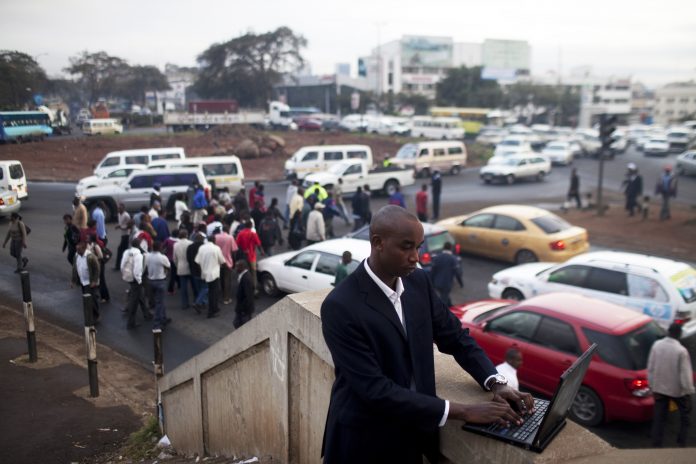At Columbia University’s 10th Annual African Economic Forum in March, Professor Murray Low, founder of the Columbia Entrepreneurship Program, engaged the top executives of young, Africa-focused enterprises on the continent’s capabilities, opportunities and challenges with respect to entrepreneurship and innovation.
“Can the continent give birth to the next Google, Walmart or Shell?” Low asked. “What’s the sector that will drive the economy in Africa? Will it be IT, consumer goods, or natural resources/renewable energy?”
The panelists unanimously agreed that Africa can indeed give birth to a Google, Walmart or Shell, and while they had different ideas about what those entities would look like, they all agreed that they will be birthed by African entrepreneurs and from external innovation. Here are the remarks of three of these young entrepreneurs, as recorded by AfricaStrictlyBusiness.com.
Jean-Claude Homawoo, head of Iroko TV Group
Can the continent give birth to a Google, Walmart ot Shell? Yes, but it’s more likely to look like a Square or an Instagram than a Google [because] in Africa the major platform is mobile.
You don’t have a strong network of angel investors where they can put $5 million in venture capital. Iroko is sort of a Hulu for African content. Most youth in Africa know how to operate the Internet. In Africa, we employ about 100 people, most of them in Nigeria. We launched an office in South Africa a couple of months ago. We started out putting movies on You Tube. When that started to explode, we started TV.
Broadband speeds are increasing every day, so we’re waiting for infrastructure to catch up so we can deliver content through a new mechanism. TV has not quite penetrated Africa as a whole. There are seven million pay TV subscribers right now in Africa, probably half the subscribership in Brooklyn. People will get all of their TV from the Internet than from satellite.
The issue is that we’re still thinking of entrepreneurship in Africa from the standpoint of copy and paste – looking at the West: how can we do a Google in Africa? That’s the wrong thing to think. Half of the world looks like Africa in terms of development. We need to start thinking of that market rather than the way Google approaches the world. We have different problems, but we have different assets.
How can I build/innovate technology meant for the continent – not copy from the West. Africa is mobile-savvy. To create technology meant for the region is what’s needed.
Iroko is for Africans, by Africans, consumed by Africans.
What will drive growth? IT. Wired magazine said this year that if you want to become wealthy in the next five years and have any knowledge of technology, it’s a no-brainer: Move to Africa.
I interned for the founder of Zipcar, Robin Chase. When he launched Zipcar, he was breaking about 15 municipal laws around driving, parking, etc. Initially he tried to petition the mayor to have the laws changed, then realized that will take too long to happen. So he focused on building the business and creating the value. And then the city realized how much benefit – less traffic – it was getting from Zipcar and changed the laws by itself.
We can’t rely on African governments to create the enabling environment. In emerging markets, government is more of a problem than a solution. The measure of success about entrepreneurship is the number of jobs created. People who have money in Africa, who can be angel investors, don’t have the legacy of a Silicon Valley to use as a justification for investing in a young, hungry entrepreneur. The only experience they have is people running away with their money.
Organize methods by which these wealthy individuals can invest in deals with global investors like New Enterprise Associates. If they could meet that wealthy individual and create a capital of trust, you will see that capital rise.
Ashish J. Thakkar, founder and CEO of The Mara Group
There’s the advantage of the fact that we don’t have legacy systems. The focus is SMEs. I agree with the whole scaling-up theory. There is not enough of an enabling environment for startups. In the U.S., it is sexy to work out of your bedroom. In Africa, they are not taken seriously. They have no credibility. There’s no visibility behind you. Who do these young entrepreneurs go to for advice when their parents are civil servants, farmers, etc.?
I believe private equity is not the right thing for Africa right now. Nigeria produces two percent of its sugar consumption and imports 98 percent. The opportunity is to set up sugar plants in Nigeria.
Private equity is not going to play a huge role in Africa. The opportunity lies in creating businesses from scratch. It’s a matter of nurturing the [entrepreneurial] sector. Unfortunately, our governments are focusing on foreign direct investment. It’s very important to have local African entrepreneurs as partners. Sub-Saharan Africa is 46 different countries, laws, culture, people, languages, history, mindsets are different in terms of priority. So this whole thing of copy and paste is not right.
Bringing in outside companies is great – they bring in ideas, etc. – but plugging into African know-how. Iroko has 10 people on the ground, people who know the market. The mobile apps we have created are for BlackBerries, not smart phones. MaraMeet is a social network app for BlackBerries, not smart phones.
What will drive growth? A combination of everything: arable land – Africa has in huge amounts; the retail industry is a huge game-changer. We have no legacy.”
Hassine Labaied, co-founder, Saphon Energy
Innovation has been and always will be the main engine of sustainable development. Think big, start small. Innovation is not a commodity that is owned by a certain circle. It is distributed around the globe.
The solution is within us. Ten percent of the Tunisian population is the Tunisian Diaspora. They have money, they can invest. The problem is, the investment is mainly in real estate.
At Saphon Energy, the dream is Tunisia, the technology is Tunisia, the team is Tunisia – coming from Africa. What we would like to inspire – set as a precedent – is, nothing is out of reach. We’re progressing against the odds in an industry that is extremely challenging. The market is controlled by 10 multinationals. IT is all about innovation – how to get confidence, how to get faith.













